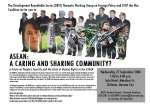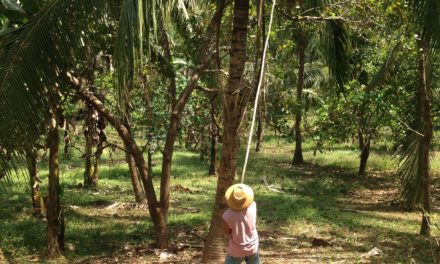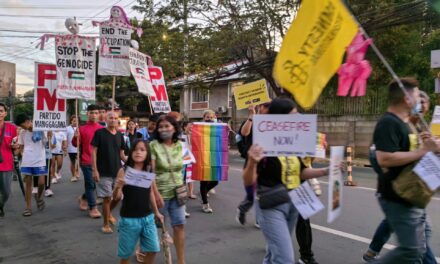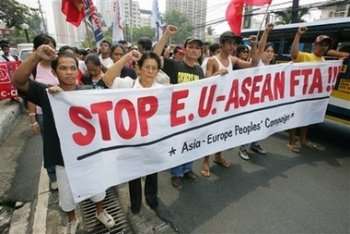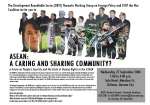 The ASEAN has traditionally avoided thorny intra-region foreign policy and security issues, and the official agenda outlined by the Philippine government for its year-long chairmanship is no exception. However, as these internal issues-such as human rights violations in Myanmar and southern Thailand, political killings in the Philippines, brutal repression of secessionist movements in Indonesia, and the resurgence of authoritarianism throughout the region-take on an increasingly international import, the rigidity of the ASEAN is becoming more and more apparent, even as the need to resolve these issues become more and more urgent.
The ASEAN has traditionally avoided thorny intra-region foreign policy and security issues, and the official agenda outlined by the Philippine government for its year-long chairmanship is no exception. However, as these internal issues-such as human rights violations in Myanmar and southern Thailand, political killings in the Philippines, brutal repression of secessionist movements in Indonesia, and the resurgence of authoritarianism throughout the region-take on an increasingly international import, the rigidity of the ASEAN is becoming more and more apparent, even as the need to resolve these issues become more and more urgent.
The 12th ASEAN Summit in Cebu will therefore be a crucial venue for the 10-nation grouping to come together and flesh out the ASEAN charter, which will define to a large extent the future character of the ASEAN as a regional organization ( i.e. whether it will be the venue to address the long-standing conflicts within the region). On the part of civil society, the summit marks an opportunity to be actively engaged in this process while the chairmanship is held by the Philippine government, which is traditionally the most amenable to civil society participation as compared to the other nations.
Given the significance of the upcoming summit, the Thematic Working Group of the Development Roundtable Series on Foreign Policy would like to invite you to "ASEAN: A Caring and Sharing Community?", a forum that aims to critically analyze the ASEAN states' policies and issues in relation with peace, security, and human rights; and, at the same time, consider an alternative vision for ASEAN that Philippine civil society should push for and imagine ways at which the 12th ASEAN summit can be used to push for this vision. The forum will be held on the 27th of September 2006 , from 1 to 4 p.m., at the Sulo Hotel .
A discussion on the "Military Take Over In Thailand: Destroying Democracy In Order To Save It? Thanksin Now, Taksil Later?" with Dr. Walden Bello of Focus on the Global South will follow shortly after the ASEAN public forum, from 4-5pm.
Wednesday 27, Septemeber 2006,
1:00 to 4:00 PM
Sulo Hotel, Matalino St, Diliman, Quezon city
RSVP
Herbert Docena/ Kenneth Cardennas
433 3387 or 433 0899
ASEAN: A Caring and Sharing Community?
A forum on People's Security and the State of Human Rights in ASEAN
In preparation for the 12th ASEAN Summit to be held in Cebu City in December
Presented by the Development Roundtable Series (DRTS) Thematic Working Group on Foreign Policy
The 12thAssociation of Southeast Asian Nations summit that will be held in Cebu this December presents a unique confluence of access and opportunity for civil society to shape the future of the ASEAN. The participation of civil society groups that will press for alternative venues is imperative. The Development Roundtable Series on Foreign Policy aims to achieve this within the context of formulating an alternative, democratically-determined Philippine foreign policy. It will situate the issues currently confronting the ASEAN within the history of conflict in Southeast Asia, the history of the organization, and wider economic and political trends in the international community today.
Foreign Affairs Secretary Alberto Romulo, in a speech to the first meeting of the 40th ASEAN Standing Committee, identified energy security, counterterrorism, and migration as the flagship issues of the Philippine chairmanship of the ASEAN. While there is nothing contentious about this list, the problem is exactly that. For it is precisely the contentious issues, such as the dictatorship in Myanmar, Thailand's violation of human rights in its southern region, political killings in the Philippines, Indonesia's treatment of West Papua, and the reemergence of authoritarian tendencies among its current crop of leaders, that are perennially sidelined by the organization.
This reluctance toward tackling thorny intra-region foreign policy and security issues owes largely to the ASEAN's founding principle of mutual non-interference. As these internal issues take on an increasingly international character, however, the rigidity of the ASEAN is becoming more and more apparent, even as the need to resolve these issues become more and more urgent.
For civil society, the Philippine chairmanship of the ASEAN marks a significant conjuncture for two reasons. First, the 12th ASEAN summit will serve as the venue for defining the agenda of the East Asian Summit, a 16-nation community with the ASEAN forming the nucleus, as well as for fleshing out the ASEAN charter. The summit, therefore, will define to a large extent the future character of the ASEAN as a regional organization and, consequently, the Philippines' foreign policy.
Second, the Philippine government has traditionally been the most amenable to engaging civil society in the ten-nation grouping. One of its stated objectives, upon acceding to the chairmanship, is to achieve a more comprehensive integration of non-governmental organizations in ASEAN affairs through the ASEAN Peoples' Assembly. Once the chairmanship rotates to another member-state-either Myanmar or Singapore-by next year, civil society participation will be severely restricted.
Discussion questions:
1.) What are the ASEAN states' policies and issues in relation with peace, security, and human rights?
2.) What alternative vision for ASEAN should Philippine civil society push for?
3.) In what ways can we make use of the 12th ASEAN summit to push for this vision?

